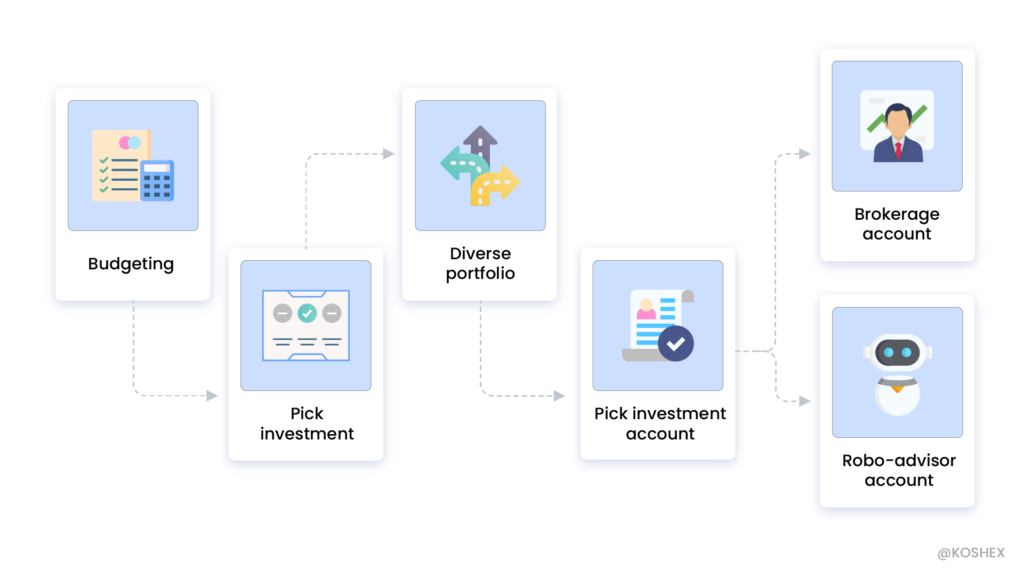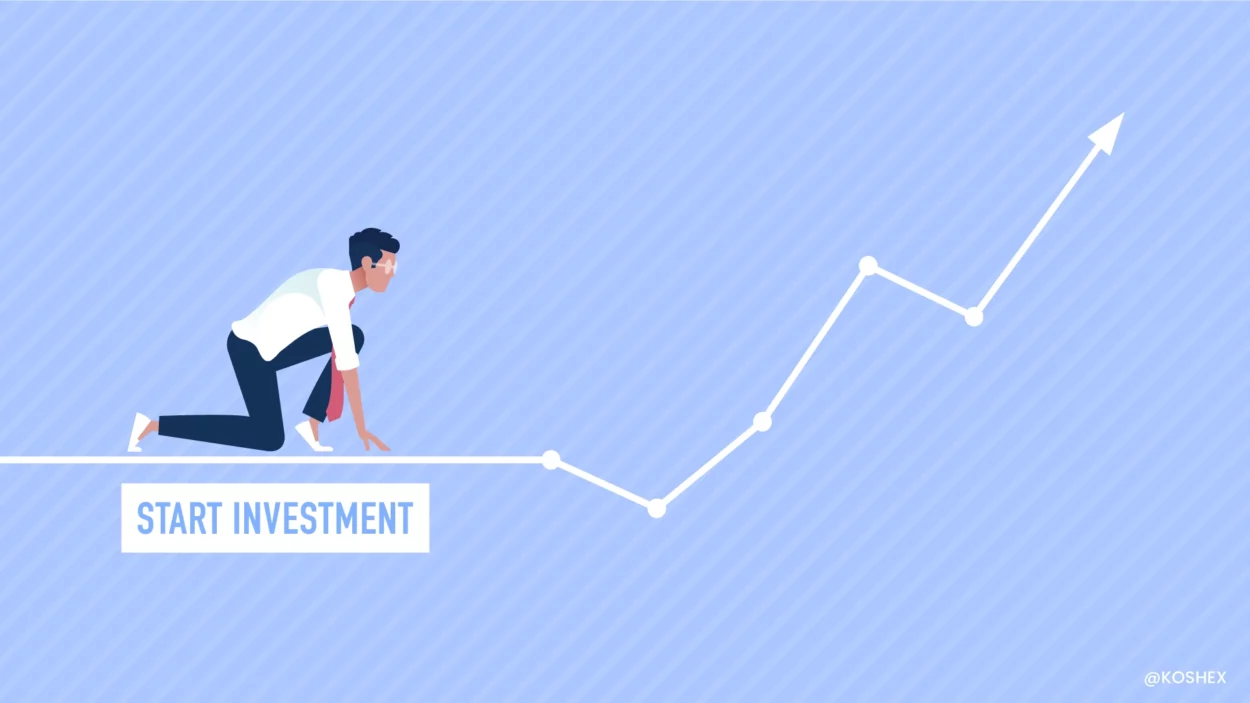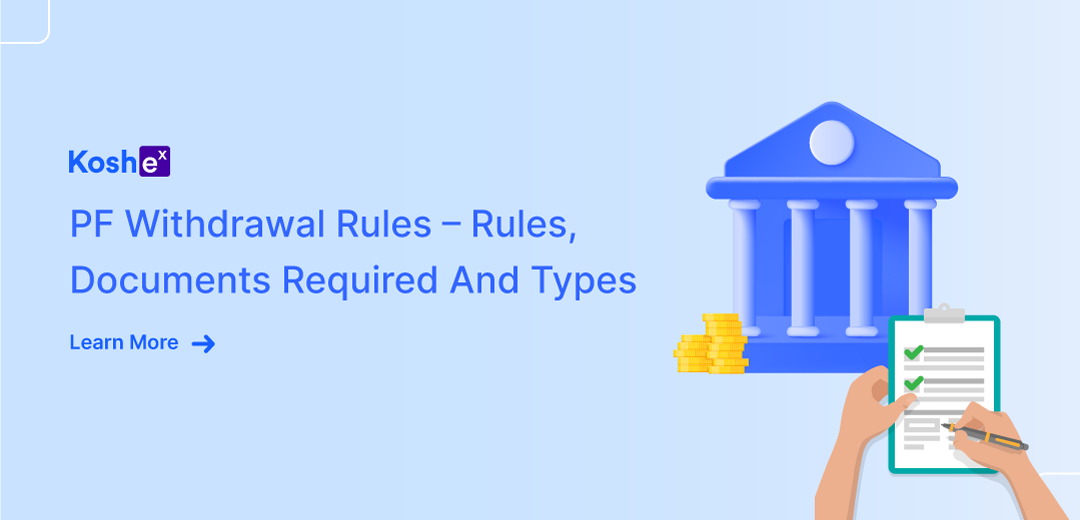How to start investing A Beginner’s Guide?
Getting that first paycheck is a memory that most of us hold close to our hearts. In many ways, it denotes financial independence and the means to achieve our dreams.
While you may have spent the first couple of checks splurging on yourself and your family, there comes a time when you start thinking about saving and investing.
It happens because you start thinking about your big financial goals that you would like to achieve in the long run. Unless you start saving today, fulfilling them may remain a distant dream.
While saving is the first step towards it, you also need a way to grow your money. That is where putting your money into investment instruments kicks in.
Investments grow your money by generating an alternate source of income. Instead of having to work to earn this income, you earn it by strategically deploying your resources into investment tools.
In India, most investment beginners take the route of opening a fixed deposit to earn this passive income. It happens because they are considered safe and have helped the previous generations save money and build wealth.
Although these conventional bank deposits are incredibly safe investments, they aren’t always the most rewarding. The rate of return doesn’t compare to other instruments, such as the stock market.
If you are a beginner in the world of investments, there is a lot for you to explore. In this article, we have rounded up some concepts, notes, and tips that will equip you to invest smoothly as a first-time investor.
Investment Essentials 101
Before you set out on your quest for investing, you may want to establish a few things to navigate this space more smoothly.

1. Budgeting
There exists an equal share of horror and success stories from the stock market. However, the fine line that keeps a success story from turning into a loss-ridden tale is woven out of the discipline to call it quits when it is time.
Picking a budget beforehand will ensure you dedicate only a limited amount of funds to invest.
If you make good returns, you can reinvest or look at increasing your budget. However, it is essential to ensure that you do not pursue that investment once you have overshot your budget.
2. Picking your Investments
The stock market is flush with investment options for first-time investors. You don’t necessarily have to invest only in stocks, which you may find risky. You can explore other options such as bonds, debentures to real estate, and commodities.
While the opportunities may be endless, the funds at your disposal maybe not.
Therefore it is essential to select the type of investments you want to pursue, depending on the expertise and knowledge you have about various spaces.
3. Ensuring a Diverse Portfolio
It is essential to not put all your eggs in one basket. For example, you may have a budget of INR 1 lakh to invest, and you may purchase INR 1 lakh worth of stocks of a certain company.
In such a case, you are putting yourself at the risk of incurring severe losses if the price of the stock were to fall. However, if you purchase smaller amounts of stocks from different companies, you can spread your risk.
The possibility of all the stocks plummeting is minimal unless there is a larger macroeconomic issue. You can further reduce your risk by putting a part of your budget into debt investments such as bonds.
4. Understanding your Risk Appetite
While choosing an investment instrument, there are a lot of aspects that come into play. For instance, your risk capacity and appetite play a vital role in your financial decisions.
The investment tools should align with your personality. If you are a person who likes to play it safe, putting your money into risky instruments like the stock market is inadvisable.
Similarly, if you have a short time horizon and know that you will need to liquidate in the near future, it is better to put your money in safe places.
However, if you have just started working, have fewer responsibilities, and have a lot of time in your hand, you can consider more risky propositions. With high risk comes the possibility of higher returns.
If it aligns with your personality and you know that cyclical ups and downs won’t stress you out, you can very well go ahead with them.
5. Picking an Investment Instrument
Now that you have narrowed down your budget, done your market research, and have selected the stocks that you would like to purchase, the next step is to actually acquire those stocks.
To do so, you will have to open an investment account, more commonly referred to as the brokerage account.
Owing to technological advancements, you can now open your brokerage account from the comfort of your home. That too, at negligible rates and charges.
As a first-time investor, you can explore two methods for opening your investment account – a brokerage account or a Robo-advisor account. Let us see them in detail.
Brokerage account
Considered the cheapest way to enter the stock market, online brokerage accounts make investing accessible to everyone.
When you research the market to open your own brokerage account, you will come across a wide number of online brokers that offer extensive facilities for limited fees. To open this account, you will need the following:
- A Passport-size photograph.
- Copy of your PAN card.
- Identity proof such as voter ID, passport, driving license, aadhaar card, PAN card, or any other authorized photo identity proof.
- Address proof such as passport, ration card, driving license, voter ID card, bank passbook, electricity bill, self-declaration from the high court or supreme court, identity card or address proof given by the recognised authority.
To do your central KYC, you can approach the office of a mutual fund house, a mutual-fund distributor (regulated by SEBI), or a registrar. You will be required to correctly fill your KYC form and attach photocopies of the required documents.
An in-person verification (IPV) needs to be carried out to testify the validity of the form and documents. NRI (Non-Resident Indians) investors are authorized to attest the KYC documents and carry out an in-person verification (IPV) when visiting India. Click here to check your CKYC status, and complete it with Koshex if incomplete.
Robo-Advisor account
A Robo advisor account is the virtual equivalent of hiring a broker or brokerage firm.
Robo advisors can be perceived as a full-service investment facility that does not require customers to do any actual trading or investment work themselves.
The Robo advisor service inquires about an investor’s goals during the application process and then builds a portfolio in order to achieve those goals.
With this information, you are now well-equipped to enter the world of investing.
However, as mentioned in the earlier tips, it is essential to pick a few investment avenues you would like to start off with as a first-time investor.
Let’s have a look at some basic types of investments you are likely to encounter as a first-time investor and how you can progress into the world of investing.
Starting off with Mutual Funds
If you wish to benefit from the high returns of trading in stocks without getting your hands dirty, you can choose to invest in a mutual fund. Managed by professionals, mutual funds are one of the most popular forms of investing.
To further streamline the process of mutual funds investments, you can avail the services of Koshex.
Mutual funds are managed by fund managers who are highly qualified and experienced investors. They pool vast amounts of funds from multiple investors and put it in accordance with the investment thesis.
When you ‘buy mutual funds, you are essentially contributing a certain sum to the pot. Your returns are in line with the size of your investment and the performance of your fund.
It may help to note that when you invest in mutual funds, you are in effect using the service of a fund manager and an investment entity.
It is the reason why mutual funds have fees attached that may impact your eventual gains. However, it is nominal and is offset by the fact that you have a professional choosing your investments for you.
Mutual Funds come in various types like equity, debt, or hybrids of the two. Thus, when choosing a mutual fund to invest in, make sure you really understand the kinds of investments the fund does, the manager’s experience, and how the fund has performed over time.
It will protect your interests and help you in making an informed decision.
Progress to Market Investments like Stocks
Did you know that Warren Buffet has a significant investment in the stock market and that it has played a crucial role in building his wealth? When you are a beginner, this space may seem daunting, and rightly so.
However, it may come as a relief that no successful stock market mogul had made it big overnight. It needs time and patience.
The best place to start is by doing your own research to follow a few stocks.
You can take the help of your friends or follow new channels and websites to identify the companies that may have a good run on the stock exchange.
In the following weeks, study as much as you can about these companies. For instance, try to understand their future plans, goodwill in the market and their financial reports.
As you do this, you will get the confidence to invest in their stocks. However, you may want to note that investing in the stock market should be your long-term strategy.
Historically, the stock market has given good returns to shareholders who have stayed invested for a long time. Of course, there may be a few exceptions to this. For instance, if a company is going under, it is better to sell and protect your interests.
Bonds and Real Estate
If neither stocks nor mutual funds meet your investment needs, you have two other options: bonds and real estate.
For your easy understanding, it may help to note that bonds function in a manner that is opposite to stocks. While stocks are an equity instrument, bonds are a debt instrument.
Therefore, when you purchase a bond, you lend a certain amount to the company.
In return, the company or the borrower repays you the principal amount by a fixed date. As an investor, you also get routine interest payments up until you receive your investment in full.
You can also choose to trade the bonds through the stock market if you’re looking for a short-term exit.
Bonds come in various tenures and are issued by a number of entities, such as companies, municipalities, and even the government.
The last one is the least risky investment you can make, and the payment is always guaranteed.
There exists a faction of individuals who believe that real estate is the most stable and only reliable investment. Admittedly, this opinion stems from the relatively non-existent tangibility of stock when compared to the thousands of kgs of brick and mortar.
Yet, real estate investments have been a staple part of investors‘ portfolios. As a first-time investor, putting your money in real estate might be challenging due to the exponentially higher capital that is required.
Real estate also tends to require quite a long-term investment horizon.
Pro Tip: Does tracking and budgeting sound hard? Try Koshex today. 20% of Koshex customers who tracked their expenses through the platform were able to save more money and make investments in financial products, which helped them achieve their financial goals, easily and efficiently.
Key Takeaway
The world of investing comprises a vast expanse of options. As the opportunities offered by the stock market are limitless, it is no wonder that a countless number of individuals move to the stock market to benefit from the high returns. However, it requires thorough research, analysis, understanding, and some level of experience. As a first-time investor, it is essential to focus on acquiring knowledge and experience and not getting carried away by your desires.









I have bookmarked your blog and refer back to it whenever I need a dose of positivity and inspiration Your words have a way of brightening up my day